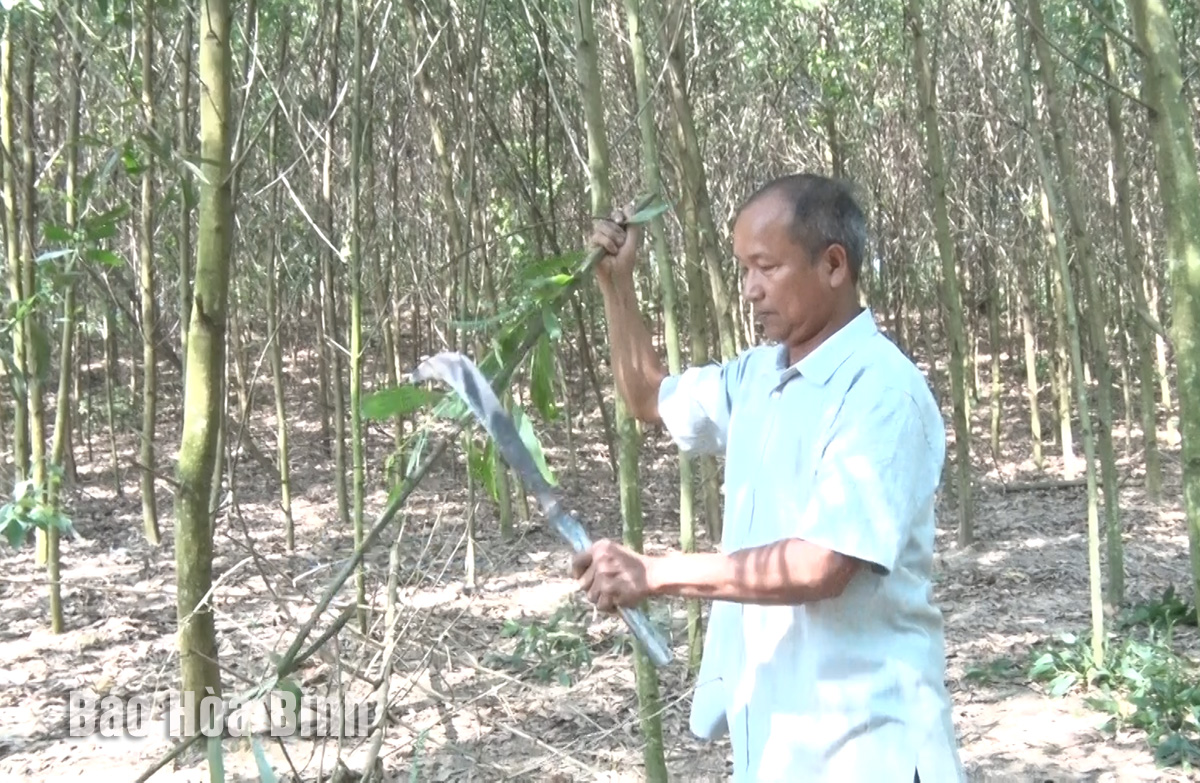
Kim Boi district of Hoa Binh province has identified the movement to encourage farmers to emulate in production and business, unite to help each other get rich and reduce poverty sustainably as one of the three key emulation movements, according to Chairman of the district Farmers' Association Nguyen Manh Hung.
In recent years, the farmers’ associations at all levels in the district have done a good job of disseminating and encouraging members and farmers to innovate their mindset and change their ways of doing, effectively exploit the potential and strengths of capital, labour, and land for investment in production and business, thus gradually escaping poverty and getting rich. Through the movement, many farming households have developed into businesses and cooperatives in agricultural production and business, creating jobs and stable incomes for hundreds of rural labourers.
Do Cat Luc, member of Sao Bay commune Farmers' Association (Kim Boi district), develops combined production model that brings high economic efficiency.
Since 2015, the family of Do Cat Luc, a member of the Farmers’ Association of Sao Bac hamlet, Sao Bay commune, has removed mixed gardens to expand a combined production model. Luc shared that with a total area of about five hectares, his family is currently growing three hectares of acacia, raising pigs for meat, and chickens and ducks for eggs under the canopy of trees; and uses about two hectares of water surface to raise fish. In 2023, the family's total income reached about 800 million VND (32,200 USD). In addition, his family creates stable jobs for four local people with an average salary of 5 million VND a person a month.
In 2023, Kim Boi district had 10,846 households registered to meet the standards of good production and business households at all levels, of which 5,971 were recognised, including 10 at the central level, and 202 at the provincial level and 10 households at the district level.
To create conditions for member households to gain access to loans, the farmers' associations at all levels in the district have received and well managed entrusted loans from the district Bank for Social Policies, with a total outstanding debt of 138.4 billion VND and 3,428 borrowers.
The movement has helped change the mindset and working method of farmers in Kim Boi district, and helped them get rid of poverty and become rich, thus contributing to building new-style rural areas and ensuring social security.
Dao Village’s honey – a product certified with a 3-star OCOP (One Commune One Product) rating by Thong Nhat Agricultural Cooperative in Dao Village (Hoa Binh City) – is highly regarded by consumers for its quality, richness, and variety in packaging. The distinctively sweet taste of Dao Village’s honey leaves a lasting impression on anyone who has tried it.
In alignment with Project No. 07-DA/TU, issued by the Hoa Binh provincial Party Committee on November 1, 2021, Lac Thuy district has actively promoted investment and supported the sustainable development of its industrial and handicraft sectors during the 2021–2025 period. Alongside this, the district has remained committed to preserving and revitalising traditional craft villages.
Located in the northern part of Lac Thuy district, with a temperate climate and fertile soil, Phu Thanh commune has great potential and advantages in growing tea. The long-standing experience, combined with strict adherence to organic farming practices in the tea gardens, ensures that the dried tea products from Phu Thanh and Lac Thuy as a whole are sold out immediately upon production, providing a stable and prosperous life for the local people.
Amid efforts to streamline the administrative apparatus, Hoa Binh province has intensified measures to address challenges in land clearance, resettlement support, and infrastructure investment, aiming to speed up the progress of key projects.
Hoa Binh province has posted an unprecedented economic growth rate of 12.76% in the first quarter of 2025, marking its highest quarterly performance to date and positioning it as the second fastest-growing locality in the country, trailing only Bac Giang province.
Under current regulations, products in the One Commune – One Product (OCOP) programme that are rated three stars or higher must undergo re-evaluation every three months. However, in reality, some of these products fail to consistently meet the required standards, raising concerns about the sustainability of their OCOP certification. This underscores the urgent need for producers to enhance product quality and gradually develop their OCOP products into strong, marketable brands.



